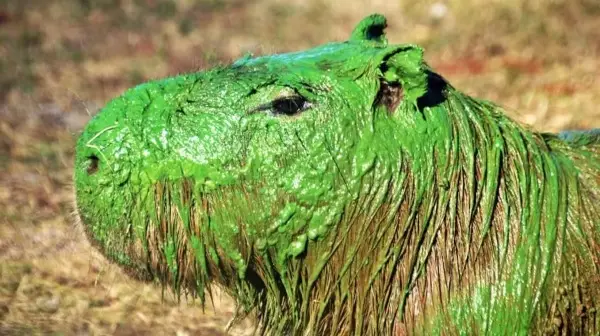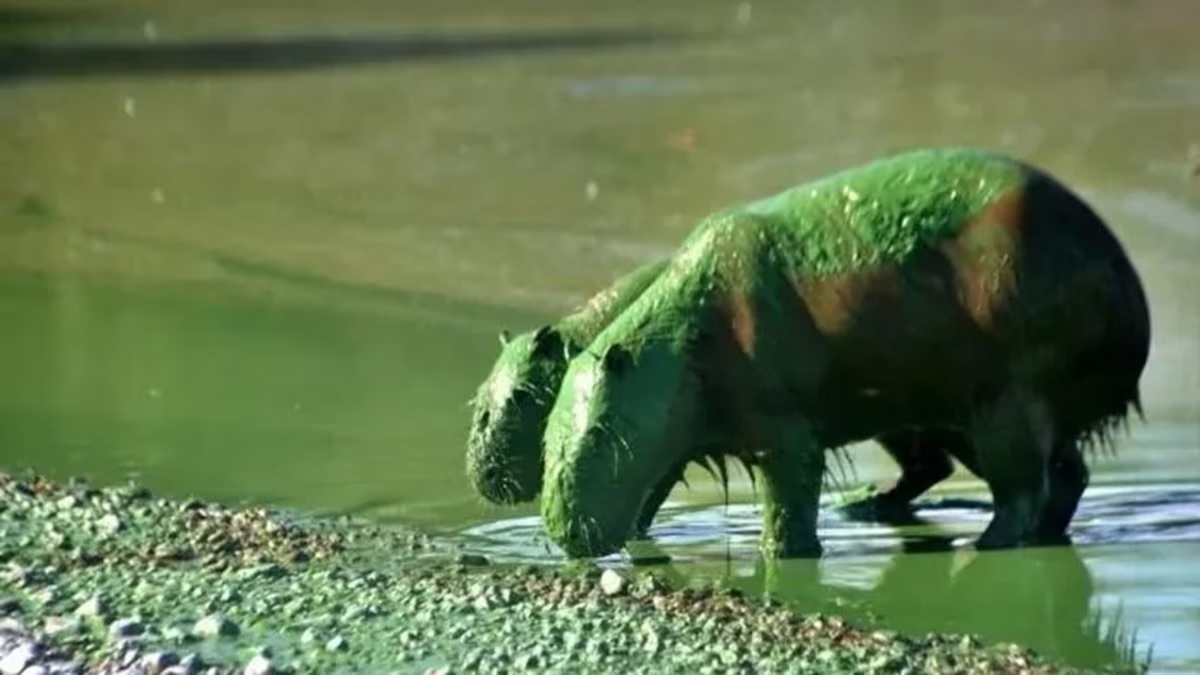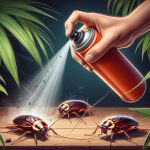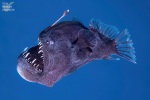It's not a manipulated photograph! Green capybaras found in Argentina
Green alert in Entre Ríos, Argentina! Hulk-style capybaras surprise in the city of Concordia. The bacteria dyed them in Lago Salto Grande. Do you take precautions?...
Table of Contents
- How to protect yourself from these aquatic pranksters?
- The call to action: fewer nutrients, fewer problems
Follow Patricia Alegsa on Pinterest!
No, we are not talking about an alien invasion or a costume contest for capybaras. In Concordia, Entre Ríos (Argentina), the residents woke up one day to surprising news: their adorable capybaras seemed to have taken a bath in green paint. But don’t worry, it’s not an early carnival prank or a Hollywood special effect. The culprit is a small and mischievous bacterium.Cyanobacteria, known for their natural antics, have dyed Lake Salto Grande with a greenish hue that seems straight out of a science fiction movie. These microorganisms, though tiny, can cause a big stir. The proliferation of these bacteria, especially during hot weather, turns the water into a slippery green breeding ground. And while those green capybaras could make a good comic book cover, this phenomenon is far from harmless.
Cyanobacteria are not only masters of camouflage, they are also expert chemists. They can release toxins into the water, which if not handled carefully, can become a health hazard for both animals and humans. And no, it's not the kind of thing you want on your list of "things to try this summer."
How to protect yourself from these aquatic pranksters?
The first rule of the non-green club: avoid direct contact with contaminated water. If you find yourself in an affected area, it's best to stay informed about water quality. The Uruguay River Administrative Commission (CARU) advises closely following local recommendations. And if you encounter cyanobacteria, wash yourself immediately with potable water. Because no one wants to end up with an unpleasant souvenir on their skin.
The World Health Organization (WHO) has already raised the alarm: these bacteria are an emerging problem. Symptoms of exposure are anything but pleasant, ranging from skin irritations to more serious issues like vomiting or muscle weakness. Therefore, prevention is key.
The call to action: fewer nutrients, fewer problems
The increase of nutrients in the water, such as phosphorus and nitrogen, feeds these little green monstrosities. That’s why CARU has urged taking measures to reduce the nutrient load. What’s the goal? Less agricultural and urban waste ending up in our rivers. So, if you ever wondered how you can help, there you have an answer.
In short, although the green capybaras may bring a smile to our faces, the cyanobacteria phenomenon is no joke. With a little awareness and by following the recommendations, we can prevent these mischievous bacteria from getting their way. So, let’s take care and keep those waters crystal clear!

Subscribe to the free weekly horoscope
Aquarius Aries Cancer Capricorn Gemini Leo Libra Pisces Sagittarius Scorpio Taurus Virgo
-
 A baby almost falls off a roof and is saved by neighbors
A baby almost falls off a roof and is saved by neighbors
Impressive video shows a toddler almost falling from the roof of a house due to recklessness. -
 Researchers Discover That Comatose Patients Have Awareness
Researchers Discover That Comatose Patients Have Awareness
Study reveals that people in a coma maintain awareness, even if they do not respond. Researchers from several countries analyze how this could transform their medical care. -
 Fashion Trends: Maxi Bags, How to Choose Yours
Fashion Trends: Maxi Bags, How to Choose Yours
Maxi bags step out of the backstage and take center stage: which to choose, what to avoid, ideal colors for you. -
 Why do aerosol insecticides fail against cockroaches?
Why do aerosol insecticides fail against cockroaches?
Aerosol insecticides do not eliminate all cockroaches, especially German ones. Scientists from Kentucky and Auburn emphasize the need for new control strategies. -
 Why is International Albinism Awareness Day celebrated?
Why is International Albinism Awareness Day celebrated?
Every June 13th is not just another day on the calendar. Since 2015, this day has become a beacon of hope, inclusion, and awareness for thousands of people around the world.
I am Patricia Alegsa
I have been writing horoscope and self-help articles professionally for over 20 years.
Subscribe to the free weekly horoscope
Receive weekly in your email the horoscope and our new articles on love, family, work, dreams and more news. We do NOT send spam.
Astral and numerological analysis
-
 Discover your future, secret personality traits and how to improve in love, business and life in general
Discover your future, secret personality traits and how to improve in love, business and life in general
-
 Online Dream Interpreter: with artificial intelligence
Do you want to know what a dream you had means? Discover the power of understanding your dreams with our advanced online dream interpreter using artificial intelligence that responds to you in seconds.
Online Dream Interpreter: with artificial intelligence
Do you want to know what a dream you had means? Discover the power of understanding your dreams with our advanced online dream interpreter using artificial intelligence that responds to you in seconds.
-
 Why do airplanes avoid flying over Tibet?
Why do airplanes avoid flying over Tibet?
Discover why airplanes avoid flying over Tibet, a region that reaches over 4,500 meters in altitude, complicating commercial flights. -
 The incredible gift that boxer Mayweather gave to his grandson!
The incredible gift that boxer Mayweather gave to his grandson!
Mayweather surprises: he gifts his grandson a building in Manhattan for Christmas, valued at over 20 million euros! -
 How we think influences the perception of the passage of time
How we think influences the perception of the passage of time
Researchers find that our brain acts as a recorder of experiences. From this, it seems to us that time passes more quickly or slowly. -
 Ralph Macchio at 62: How does he manage to stay so young?
Ralph Macchio at 62: How does he manage to stay so young?
At 62, Ralph Macchio, star of Karate Kid and Cobra Kai, surprises with his youthful appearance. Discover his secret and his family legacy! -
 Effective Strategies to Improve Depression
Effective Strategies to Improve Depression
Discover the exclusive strategies to understand and effectively support those living with this illness. Get informed now! -
 Discover the reason for the longevity of the shark that lives up to 500 years
Discover the reason for the longevity of the shark that lives up to 500 years
Discover the shark that lives up to 500 years. Scientists reveal its secret to resisting aging. A wonder of nature! -
 Goodbye, devil fish! The abyssal creature that surprised the world has died
Goodbye, devil fish! The abyssal creature that surprised the world has died
The black devil fish, a rare visitor to the Canary Islands, dies in broad daylight. It now lies in the Museum of Nature in Tenerife, ready to be studied. -
 What does it mean to dream of meetings?
What does it mean to dream of meetings?
Discover the meaning of your dreams with encounters in this article. Understand how they can influence your life and what messages they are sending you. -
 17 Tips to Avoid Conflicts and Improve Your Relationships
17 Tips to Avoid Conflicts and Improve Your Relationships
Learn how to effectively avoid or resolve arguments with your partners, family members, or work colleagues. Discover how to turn them into constructive and enriching moments. -
 How your zodiac sign can make you feel vulnerable in a relationship
How your zodiac sign can make you feel vulnerable in a relationship
Find out how your zodiac sign reveals your vulnerabilities in relationships - read on now! -
 You should avoid covering your mouth while sleeping
You should avoid covering your mouth while sleeping
In English, it is called mouth taping: a viral method that encourages breathing through the nose by taping the mouth shut. Why you should avoid it. -
 What bothers you most about yourself according to your zodiac sign when you are in love
What bothers you most about yourself according to your zodiac sign when you are in love
Discover the actions that can annoy your partner. Find tips to improve the coexistence in this article. -
 What does it mean to dream of mist or fog?
What does it mean to dream of mist or fog?
Discover the meaning behind your dreams with mist or fog. This article will help you understand the messages your subconscious is sending you - read more here!